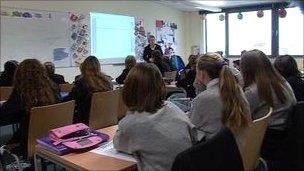Minister confirms more pupils per teacher in Jersey
- Published

Jersey education aims to have a maximum class size of 26 pupils
The ratio of pupils per teacher increased over the past three years, Jersey's education department has said.
The department said the change was minimal and that parents should not worry.
Jim Westwater from Jersey Education said there were fewer teachers but there were more teaching assistants.
D'Auvergne Primary School in St Helier saw a change from 16.12 pupils per teacher in 2008 to 20.58 pupils per teacher in 2010.
Jersey's largest primary school, Rouge Bouillion saw a drop in the pupil to teacher ratio from 19.96 in 2008 to 18.98 in 2010.
Early years
Mr Westwater said: "They are certainly bigger in the early years of primary school. We have experienced more children coming through and haven't increased the number of classes.
"As such the pupil to teacher ratio in the early years has increased."
Pupil teacher ratios include the head teacher, deputy heads and special educational needs teachers.
Mr Westwater said Jersey had lower maximum class sizes than in the UK.
He said: "At the moment our planned maximum is 26 to 1, that is 26 children to one class, in some cases we have had to increase that.
"We are much better off than in the UK. In the UK it is not unusual to have class sizes of 33 or 34 and so on."
He said the UK pupil to teacher ratio was 21.3 whereas Jersey was 19.4 in 2010.
For secondary schools in the UK it was 15.7 pupils per teacher as opposed to 14.2 in the non fee-paying and 15.0 in the fee-paying sector in Jersey.
Mr Westwater said: "It has changed by a very small amount, we normally have one teacher per class in a primary school and the ratio only changes by virtue of more pupils or fewer pupils.
"In secondary school once they have obtained their quota of teachers the school is free to employer technicians and technical staff.
"Some schools may buy in more teachers, it is up to the school to decide how best to use the funding to educate their children."
- Published4 May 2011
- Published14 April 2011
- Published23 February 2011